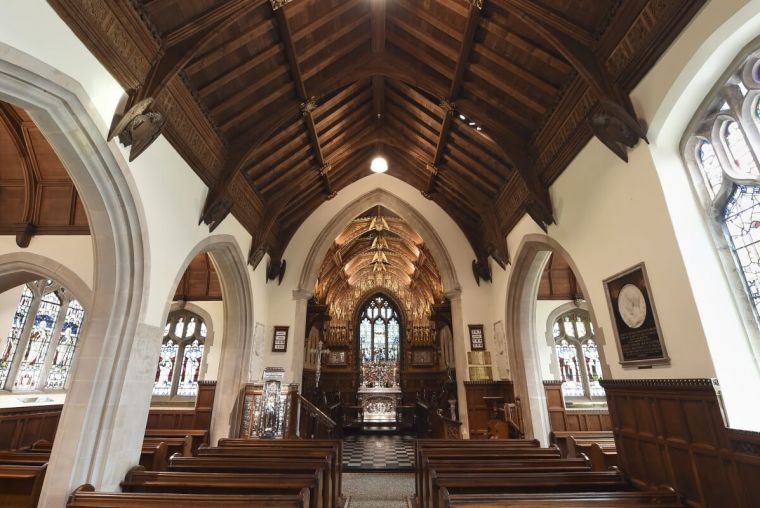Is a shift in theology enough to stop mainline decline?
There is no denying the importance of firm, central beliefs in determining the vitality of a religious group. A recent study in Canada has drawn increased attention to the link between growing churches and the importance of a foundation in Christian orthodoxy. Meanwhile, mainline churches, which tend to be less dogmatic compared to conservative denominations, have declined from 16.1 per cent of the population to 14.7 per cent of the US population between 2007 and 2014.

Is there hope for the mainline Church in America? Or is it possible that the decline is so great that mainline Protestants won't last much longer than '23 Easters'? It's likely that mainline churches may need more than theological renewal in order to survive.
Theological decline and social institutions
The decline of the mainline Church in America has been well-documented for decades. Back in 1993 experts were noting the lack of theological vitality in many mainline churches. This tendency among lay Christians at mainline churches to pick and choose may have correctly identified the dogmatism of more fundamentalist Churches, but ultimately left too much room for members to abandon Christian orthodoxy.
As theology became less important to members of mainline churches, it's natural that other issues became the glue that held these congregations together. Activism and the cultural expectations of church attendance all factored into the past stability of the mainline Church. However, as these causes and expectations shifted, mainline members no longer felt a strong need to sustain their limited Christian beliefs within aging congregations.
There is no doubt that theological renewal is essential for the future of mainline churches. While each denomination will disagree about the boundaries or core tenets of this shift, affirming the Apostles Creed is an essential starting point that distinguishes the Christian tradition from others. In many cases this theological foundation is already present, but there is a greater need for stronger discipleship and teaching of these beliefs so that members are on the same page.
However, in the particular case of American mainline churches who have a history of activism and social justice work, rediscovering these traditions may prove to be a key factor in helping these Churches sustain their place in the American religious landscape.
Revitalizing an activist faith
Growing up in the conservative evangelical tradition, I frequently heard that mainline churches were 'distracted' by social justice causes and activism, losing their grip on the gospel in the process. Ironically, one could argue that while leveling this claim about the mainline, many conservatives in my own tradition were 'distracted' by activism in the Moral Majority, linking conservative Christianity with conservative politics.
In the case of mainline churches, there are many opportunities to find revitalization around gospel-focused social justice causes. These justice issues are hardly a distraction from the gospel message, and, in fact, conservative evangelicals are shifting toward a more activist faith in their work against human trafficking, involvement in prison ministry, and advocacy for creation care. There is a growing awareness in evangelical circles about how far many need to go in addressing racism and LGBT concerns.
Mainline churches already have a history of activism and social justice work, and this activism could provide yet another point of cohesion for these congregations striving to rediscover their relevance and vitality today. For instance, Rev. William Barber is now leading a national moral movement that will work toward voting rights and justice for all. Barber has avoided partisan labels, working across party lines with broad coalitions. However, the former North Carolina NAACP leader has consciously used religious terminology to drive his moral movement.
Barber can provide a template for activism that is grounded in religious conviction, and he may prove especially helpful in revitalizing the mainline churches of America. However, Barber's message may be amplified because of its context, which is another key factor to consider.
The mainline surge afer Trump's election
While white evangelical Christians voted for Trump in large numbers in the 2016 election, mainline Christians on the political left returned to church in search of comfort and answers. Seminars and events hosted by Union Theological Seminary in New York City swelled with hundreds of attenders. Mainline leaders reported higher church attendance throughout November and December in 2016.
While this Trump 'bump' may not last long, it may provide a needed boost to many mainline churches that could help over time. Combining a renewed emphasis on the theological particulars of Christianity with an energized base that has been nurtured with clear tactics and messages for social justice and morality could prove pivotal in slowing down the decline of the mainline and helping it sustain a powerful Christian presence in America.
Ed Cyzewski is the author of 'A Christian Survival Guide' and 'Pray, Write, Grow'. He writes at www.edcyzewski.com and is on Twitter as @edcyzewski.











